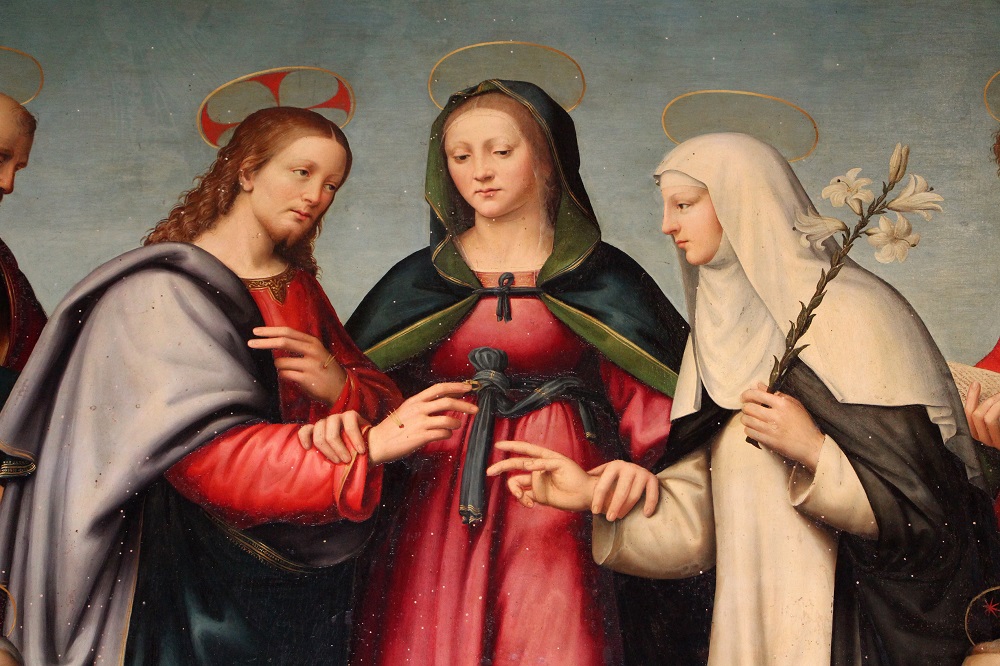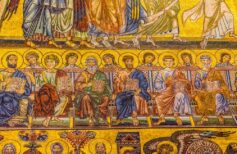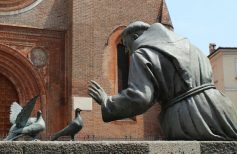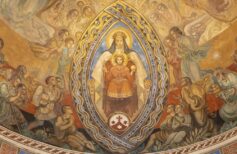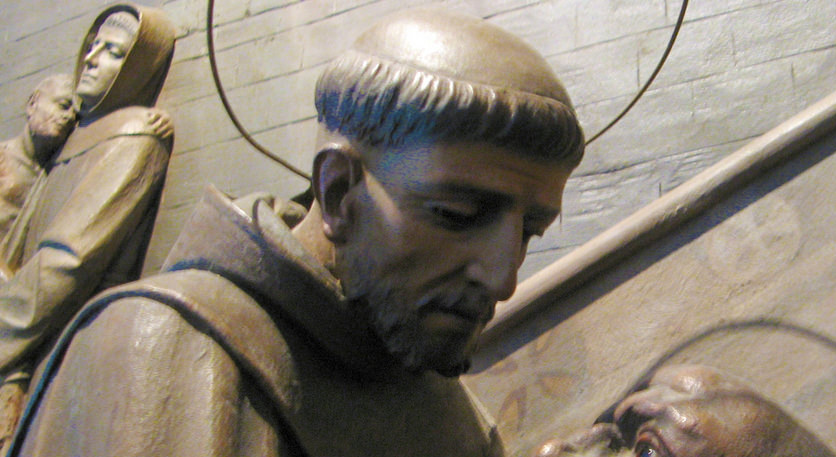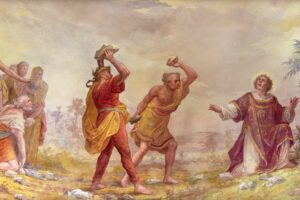Santa Caterina da Siena, from a woman of the people to an advisor to Popes and princes. Courageous, wise, and completely devoted to Christ. Let’s get to know better the patroness of Italy.
Thinking of Caterina da Siena, the first reflection that arises is how faith can truly lift us from our condition, make us better day after day, until allowing us to achieve truly surprising feats in our lives. But what is so incredible about the story of this saint, who lived in the mid-14th century in Tuscany, in a land torn apart by fratricidal conflicts and profound political and religious upheavals, yet also traversed by a spiritual, cultural, and artistic impulse that has no equal? We remember her symbols, the book and the lily: doctrine on one side, and purity on the other. A dichotomy that is perhaps also the key to understanding the greatness of this woman, who offered her life to God and His neediest children, who divided her time between caring for the sick—those afflicted by illnesses so unpleasant and dangerous that no one else wanted to treat—and writing theological texts that earned her the title of Doctor of the Church in 1970, never before conferred on a woman. A model of life that still resonates today with extraordinary relevance. It’s no wonder we mentioned her in our article dedicated to Saints who changed the world.

The saints that changed the world
The history of Europe and of the Western world as we know them goes through many and constant political and social changes, economical and thoughts revolutions.
Author of the Dialogue of Divine Providence, one of the masterpieces of medieval mystical literature, Santa Caterina was a religious, theologian, and philosopher.
‘Married’ in mystical union to Jesus, she trusted in the salvation represented by the Pope (whom she called the “sweet Christ on earth“) and the Church for all Christians.
Her Letters of comfort, advice, and exhortation, addressed to sovereigns, leaders, and literati, had an incredible effect on many events and controversies. They were later compiled by her disciples into a precious Epistolary still considered a reference for all religious.
We can confidently say that her writings and fervor gave a great impetus to the Church’s reform.
Among the saints and blessed, Caterina is also among those considered healing saints and those to turn to in case of illness. Not only because she is, among other things, the patroness of nurses, but precisely because she cared for the sick and seriously ill, especially victims of terrible epidemics.
Her absolute and total love for Jesus, capable of plunging her into mystical ecstasies of rare spiritual power, is considered a bridge between heaven and earth, an example of devotion and complete trust in God that has few equals.
But who was Santa Caterina da Siena?
Her Story
When Caterina was born, the twenty-fourth of twenty-five children of Jacopo Benincasa, a dyer, and his wife Donna Lapa Piacenti, no one could imagine what her extraordinary destiny would be. It was the mid-14th century, and for a girl like her, born in the Fontebranda district, in the Oca contrada, from a humble family, there were no other prospects than marriage and creating her own family. But Caterina was not an ordinary girl. Since childhood, she claimed to ‘see’ things, like when at six, she recounted that Jesus appeared to her dressed like the Pope, accompanied by Saint Peter, Saint John, and Saint Paul.
Christ himself would appear to her at twenty, accompanied by the Virgin Mary, His mother, to make her His bride with a ring symbolizing the mystical marriage.
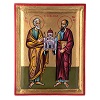
But even as a child, Caterina seems to foreshadow her own destiny because at seven, she made a vow of chastity, and at twelve, she rejected the marriage her parents wanted for her, expressing the intention of taking vows. Too poor to afford the substantial dowry that women had to present to enter a monastery and opposed by her family for her ideas, she shut herself in, dedicating her life to prayer, penance, and fasting. She renounced meat, ate very little, only bitter herbs and fruit, and used the cilice. In the end, impressed by her determination, her father changed his mind and decided to help her fulfill her dream. Legend has it that the sight of a dove hovering over his daughter praying convinced him. But to be admitted to the Mantellate, the lay Dominican Tertiaries known as Sisters of Penance of St. Dominic, Caterina had to face new obstacles. Because she was denied entry to the order due to her youth and beauty, she fell victim to a fever that disfigured her face and made her appear older than her age.
At just sixteen, she entered the order, but for three years, she lived profoundly isolated from the other sisters. The reason is simple: not knowing Latin, she could not participate in common prayer. However, the Mantellate, who usually accepted only widows and older women, allowed her to live in the world while maintaining the vows of chastity, poverty, and obedience. And so, in the world, Caterina lived, dedicating herself entirely to the neediest, the sick, those abandoned by their own relatives for the severity of their condition.
At the end of the Carnival of 1367, her mystical marriage to Jesus took place, a marriage lived in a sweet ecstasy in which her deep and enduring bond with Christ was sealed.
Meanwhile, she also committed to learning to read and write, although a good part of her letters and works were written for her by the so-called “Bella brigade,” a kind of spiritual family of disciples who loved and followed her everywhere.
Thus, her extraordinary texts were born, such as the Dialogue of Divine Providence, her Prayers, and above all, the Letters, addressed to common people, military personnel, religious, women, and even prisoners, but also to eminent personalities of the politics and religious world of the time. To the latter, in particular, she submitted civil and political issues, from the pacification of Italy to the need for a new crusade, to the return of the papal seat from Avignon to Rome, to the reform of the Church. High, complicated topics that this woman of the people managed to face with truly miraculous mastery and impressive fervor, validating the voices that claim she was directly inspired by God.
On April 1, 1375, Palm Sunday, while praying in front of the crucifix in the church of Santa Cristina, she received the stigmata, but they remained visible only to her at first. She continued her political and social activity, attempting to stop the anti-papal league that arose around Florence and making a trip to Avignon to persuade Pope Gregory XI to return to Rome. The pontiff was persuaded and returned, but upon his death, a schism occurred, and the Church found itself with two Popes, Urban VI and Clement VII, who returned to Avignon.
Caterina died on April 29, 1380, commending herself to God: “Father, into Your hands I commend my spirit and soul.”

the life of the Saint
Patroness of Italy
Therefore, Santa Caterina da Siena is celebrated on April 29, the day of her death. She is often depicted in the typical attire of the order to which she belonged, that of the Mantellate: a white dress with a black mantle. Her emblems are the white lily, a symbol of her purity and chastity, the ring symbolizing the mystical marriage with Jesus, a book and a pen, recalling her wisdom and her activity as a writer and theologian, and also the stigmata, the crown of thorns, the cross, the heart.
Since 1939, she has been the patroness of Italy, along with Saint Francis of Assisi. In 1999, Pope John Paul II also proclaimed her co-patroness of Europe.

The Canticle of the Creatures of St. Francis
St. Francis of Assisi is one of the most loved and venerated saints by the Catholic Church. Close to the poor, brother of the least, he made love for all God’s creatures his life mission and the emblem of his faith.
Novena to Santa Caterina da Siena
The Novena to Santa Caterina can be recited in preparation for her feast on April 29, for nine days starting from April 20 to April 28, or whenever the need is felt, to seek support and comfort in difficult times.
First Day
For that spirit of prayer that you had since childhood, in which you placed all your delights, and with the angelic salutation repeatedly uttered by you as many times as the steps of the stairs you climbed, continuously paid homage to the holy Virgin Mary, obtain for us, we pray, the grace to love, like you, the exercise of prayer and to always perform it in such a way that it is worthy of being heard.
Glory be to the Father and to the Son and to the Holy Spirit, as it was in the beginning, is now, and ever shall be, world without end. Amen.
Second Day
For that particular affection that you, great Saint, had for the virtue of purity, by consecrating yourself to the Lord with an irrevocable vow at the age of eight and, by shaving your head, sighing, and moaning, you rejected the most honorable offers of highly advantageous marriage. Obtain for us, we pray, the grace to always be firm in mind, heart, and conduct or to abhor with the utmost hatred everything that even slightly offends such a sublime virtue that elevates men to the level of angels and makes them dearer objects of divine pleasure.
Glory be to the Father and to the Son and to the Holy Spirit, as it was in the beginning, is now, and ever shall be, world without end. Amen.
Third Day
For that spirit of seclusion that you had, great Saint, by never desiring to be seen by others except by your Jesus, and being distracted by continuous occupations in your family, you knew how to build such solitude in your heart as to always have the mountain occupied by thoughts of paradise. Obtain for us, we pray, the grace to love solitude and withdrawal like you, despite all the invitations that the world will make to participate in its spectacles, in its pomp, and to always direct our thoughts to God amid all the most distracting occupations of our state.
Glory be to the Father and to the Son and to the Holy Spirit, as it was in the beginning, is now, and ever shall be, world without end. Amen.
Fourth Day
For that spirit of penance that you had, great Saint, from your childhood, when you punished your indulgence of a single time with the most ingenious or afflictive mortifications. Therefore, associated with the Third Order of Saint Dominic, you edified the whole world by abstaining perpetually from wine and meat, and almost even from sleep, nourishing yourself only with raw herbs, sleeping very little and on bare boards, spending all hours in prayer, always carrying around your body a painful cilice, mortifying your flesh with three disciplines every day. Obtain for us, we pray, the grace to faithfully observe those abstinences and fasts commanded by the Church, to bear with patience everything that God will deign to ordain for our good or to mortify spontaneously all the perverse inclinations of our heart and the excessive desires of our senses so that we may also have the necessary resemblance to our exemplary crucified one.
Glory be to the Father and to the Son and to the Holy Spirit, as it was in the beginning, is now, and ever shall be, world without end. Amen.
Fifth Day
For that heroic charity that moved you, great Saint, to serve spontaneously and personally heal the poor sick abandoned by all for the loathsomeness and then the stench of their gangrenous wounds, and from whom you were not relieved except with the most dishonorable insults, slanders, and calumnies. Obtain from the Lord the grace for us to always be equally ready to help our neighbour in every need and to generously forgive, rather to reciprocate with benefits, all the insults that may be done to us, so that we may deserve in this life and the next the beatitude promised to the true meek and merciful.
Glory be to the Father and to the Son and to the Holy Spirit, as it was in the beginning, is now, and ever shall be, world without end. Amen.
Sixth Day
For that admirable fortitude that, with the doubling of prayers, austerities, and fervour, you demonstrated, great Saint, against all the powers of the interior that unleashed against you persecuted you for so long with the most unworthy images in the most violent temptations. For this, you received as a reward from your divine Spouse, beyond the familiarity of speaking and dealing with His Saints and His mother Mary, the raptures, ecstasies, revelations, and the most intimate communications with Him, until being declared His spouse with the sensible gift of a rich ring. Obtain for us, we pray, the grace to be equally strong against the assaults of our spiritual enemies so that the reward of our fidelity may always increase every day in divine love until we deserve with certainty the inseparable union with the supreme Good.
Glory be to the Father and to the Son and to the Holy Spirit, as it was in the beginning, is now, and ever shall be, world without end. Amen.
Seventh Day
For that supernatural light with which you were miraculously endowed, great Saint, by which you could serve as a counsellor to the Roman Pontiffs with many letters, being personally consulted by them, and reveal to them what they had resolved in their own hearts, and obtain from them the long-awaited restoration of the Holy See in Rome, which had been deprived of it for seventy years. Obtain for us from the Lord the grace to always know in our doubts what is most in conformity with God’s will and most suitable for the salvation of our souls so that from our resolutions may derive the increase both of our fervour before God and our edification concerning our neighbour.
Glory be to the Father and to the Son and to the Holy Spirit, as it was in the beginning, is now, and ever shall be, world without end. Amen.
Eighth Day
For that singular devotion that you had, great Saint, to Jesus Christ in the Blessed Sacrament, by which you were more than once communicated by His hand and refreshed at His side with His divine Blood. Then, having lost the taste for food, you endured for eight years from the beginning of Lent until the day of the Ascension without nourishing yourself with anything other than the most holy Eucharist. Obtain for us, we pray, the grace to bring to the Most Holy Sacrament a love like yours, so that we make it our delight to linger long in His presence, to frequently receive Him into our hearts, and to give Him the greatest possible glorification in every circumstance.
Glory be to the Father and to the Son and to the Holy Spirit, as it was in the beginning, is now, and ever shall be, world without end. Amen.
Ninth Day
For that extraordinary love, you had for suffering, by which you ascribed to great fortune the suffering of all the pains of a crucified body in the invisible stigmata. Surprised by the last illness, you became a spectacle of admiration to the whole world for the serenity and glory with which you endured the most terrifying torments. Obtain from the Lord the grace for us to receive with Christian resignation, indeed with holy joy, all the crosses with which God will deign to visit us, so that after having borne the mortification of Christ in our members, we may, with you, participate in the fullness of His beatitude in the house of eternity.
Glory be to the Father and to the Son and to the Holy Spirit, as it was in the beginning, is now, and ever shall be, world without end. Amen.

